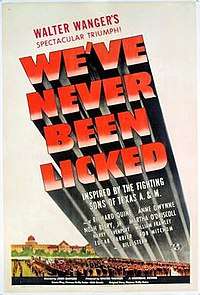We've Never Been Licked
| We've Never Been Licked | |
|---|---|
 Theatrical Poster | |
| Directed by | John Rawlins |
| Produced by | Walter Wanger |
| Screenplay by |
Norman Reilly Raine Nick Grinde |
| Story by | Norman Reilly Raine |
| Starring |
Richard Quine Anne Gwynne Martha O'Driscoll Noah Beery, Jr. William Frawley |
| Music by | Frank Skinner |
| Cinematography | Milton R. Krasner |
| Edited by | Philip Cahn |
Production company |
Walter Wanger Productions |
| Distributed by | Universal Pictures |
Release date |
|
Running time | 103 minutes |
| Country | United States |
| Language | English |
| Budget | $918,175[1] |
| Box office | $1,109,186[1] |
We've Never Been Licked is a 1943 World War II propaganda film produced by Walter Wanger and released by Universal Pictures. Parts of the movie were shot on location at the Texas A&M University campus. Released in the UK under the title, Texas to Tokyo; re-released in the US as Fighting Command.[2][3][4] The cast features Richard Quine, Anne Gwynne, Martha O'Driscoll, Noah Beery, Jr. and William Frawley.
Plot
In 1938, Brad Craig, the son of a famous Army colonel, arrives to start his freshman year at the Agricultural & Mechanical College of Texas (now Texas A&M University). Brad has spent the past four years in the Philippines and has acquired both an intimate knowledge of Japanese culture and a desire to invest in the modernization of Asia. At the train station, Brad is met by cadet “Cyanide” Jenkins, his new roommate; he is also introduced to sophomore cadet “Panhandle” Mitchell, who wastes little time in penalizing Brad for various violations of cadet conduct. As Brad adjusts to life on campus, he becomes romantically involved with Nina Lambert, the daughter of beloved chemistry professor “Pop” Lambert.
Following an artillery exercise, Brad observes that the brakes on his section’s caisson appear to be damaged. Panhandle disregards Brad’s concerns and orders the section to move out; when the brakes fail and the caisson goes careening out of control, Brad risks his life to improvise a solution and prevent a disaster. His actions, which save Cyanide’s life, earn him Panhandle’s respect. Brad is soon promoted to “fish sergeant” and his upperclassmen delight in exhausting him by constantly staging fights and ordering Brad to intervene; he finally discovers the game and gets revenge.
As Brad’s college career progresses, he discusses the prospect of marriage with Nina. She, however, is secretly smitted with Cyanide (and he with her), though each is hesitant to disclose their feelings for one another. During the Field Artillery Ball, Brad encourages Cyanide and Nina to dance together, and they finally admit their mutual attraction; by the following year, they have become a couple with Brad’s blessing. Brad, meanwhile, lands himself in a difficult position when his classmates pressure him on his affinity for Japan, whose colonization efforts he supports as a means to modernize Asia. Though two Japanese- American cadets, Kubo and Matsui, come to his aid, their justification of Japanese war crimes angers the others and earns Brad the contempt of his friends.
While guarding the chemistry building one night, Brad discusses with Pop Lambert an invention of the professor’s, which will protect servicemen from poison gas. Pop hides the formula in his office to prevent tampering, but after he departs Brad is drugged and locked in a closet; he manages to escape and observes Kubo and Matsui ransacking the professor’s office. He trails the pair and confronts their employer, a traveling salesman working for the Japanese. Having taken some papers from Pop Lambert’s office, Brad offers to provide the spies with the formula in exchange for a bribe; he deliberately gives them a version of the formula which is missing a key element whose absence will render it useless.
Brad is accused of treason for his actions and, though the commandant does not have enough evidence to bring formal charges, he is ostracized by the student body and decides to leave the university. Months later, Brad is working for the Japanese Navy recording English-language propaganda for distribution in the United States. He is assigned to give radio commentary on an impending Japanese assault on the Solomon Islands; the maneuver is detected and a U.S. Navy carrier group moves to intercept the Japanese fleet. While airborne to cover the battle, Brad manages to contact the U.S. fighter group, led by Cyanide, revealing his covert infiltration of the Japanese military and offering his services to the American forces. He crashes his own plane into the Japanese aircraft carrier, disabling the flight deck and giving the Americans the advantage; Brad dies as the carrier is destroyed. He is posthumously awarded the Medal of Honor.[5]
Cast
- Richard Quine as Brad Craig
- Anne Gwynne as Nina Lambert
- Martha O'Driscoll as Deedee Dunhan
- Noah Beery, Jr. as Cyanide Jenkins
- William Frawley as Traveling Salesman
- William Blees as Student
- Harry Devenport as "Pop" Lambert
- Edgar Barrier as Nishikawa
- Samuel S. Hinds as Colonel Jason Craig
- Moroni Olsen as Commandant
- Roland Got as Matsui
- Allen Jung as Kubo
- Robert Mitchum as Panhandle Mitchell (as Bob Mitchum)
- Alfredo DeSa as Fortuno Tavares
- Bill Stern as Announcement
- George Putnam as Army Hour Announcement
Production notes
- Production Dates: mid-Nov 1942-early Feb 1943; addl scenes 30 Mar-31 Mar 1943
- The working title of this film was Texas Aggies.
Reception
The film earned a modest $283,724.[1]
References
- 1 2 3 Matthew Bernstein, Walter Wagner: Hollywood Independent, Minnesota Press, 2000 p441
- ↑ Emovieposter.com - Image Archive - TEXAS TO TOKYO ( Aust daybill)
- ↑ Martha O'Driscoll
- ↑ Paul Webster Biography - Yahoo! Movies
- ↑ http://movies.nytimes.com/movie/review?res=9503E0DD103CEE3BBC4152DFBE668388659EDE